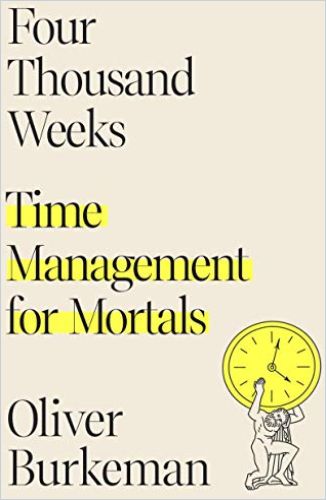Bestseller Olivier Burkeman offers a Zen method for accepting the passage and limitations of time.

Time Has Come Today
In this instant New York Times bestseller, journalist and psychology writer Oliver Burkeman reflects on time, postulating that, in a world where there never seems to be enough of it, you should take time for yourself and enjoy living. He challenges you to change your outlook on time, and to accept that you can’t control or manage it. Instead, he says, acknowledge the limits time imposes, and enjoy the time you have today.
Burkeman tosses various classical and contemporary scholars, philosophers, psychologists and spiritual gurus into a blender to distill a readable, direct, actionable guide to a healthier outlook. He offers a new, less stressful, more rewarding view of time itself and of how you relate to its passing. He’s a witty, nonjudgmental and compassionate writer; his kindness makes his lessons all the more digestible.
Critics and myriad other authors joined in praise of Burkeman’s methods and insights. He takes as given that your time on Earth is unfairly short, and he wants you to learn to savor every second of it. His approach is neither fanciful nor New Age; he’s first and foremost a rigorous thinker, and he urges you to think rigorously as well.
Four Thouand Weeks
Burkeman candidly prompts his readers to recognize the brevity of life. The average life span is 80 years, or 4,000 weeks. And while you probably have set ambitious goals for your work and personal lives, you already realize that you lack the time to follow through. Often, attempts at improved efficiency leave you feeling less in control, more anxious or burned out.
This is the maddening truth about time, which most advice on managing it seems to miss. It’s like an obstreperous toddler: The more you struggle to control it, to make it conform to your agenda, the further it slips from your control. Oliver Burkeman
Time management techniques fail because they don’t acknowledge that your time has limits. Accomplishing more does not change how much time you have or the force of distractions, societal pressures and social media. Once you accept that your time is finite, you’ll approach time more rationally. You may recognize that doing more rarely leads to greater satisfaction or productivity.
You cannot control time. Focus on what matters to you most.
Finitude
Burkeman cites Swedish philosopher Martin Hägglund’s argument that limited time forces you to treasure your experiences. If you consider your time on Earth a gift, you learn to appreciate mundane, grounding moments, such as emptying the dishwasher or waiting in line at the grocery store.
To better employ your time, learn which chores to defer, prioritize what matters and ignore everything else, take on fewer projects, and relish every moment while never obsessing about future outcomes.
Distraction is part of being human, but recognize that you might unknowingly vest in destructive distractions to avoid boredom. Yet boredom can serve as a valuable reminder of the finite nature of time and spur you to use your time more meaningfully.
Time and Money
You must set goals and plan for events, but temper your expectations and recognize that you can’t always – or ever – control outcomes. Fixating on being efficient often means you’re not enjoying the moment. And the present is the only moment you can control.
The truth, then, is that spending at least some of your leisure time ‘wastefully,’ focused solely on the pleasure of the experience, is the only way not to waste it.Oliver Burkeman
Don’t regard rest or idleness as wastes of your time. Embrace that you don’t need to be great at something to enjoy it. Remember, for example, that finishing a walk is never the goal of a walk. The goal of a walk is the process, the time it provides for you to let your thoughts run freely and the idea of enjoyable purposelessness. This teaches you patience and humility while freeing you from the anxiety of needing to do something worthwhile.
To incorporate more patience into your life, accept minor everyday problems; take on small parts of a project at a time; and follow your originality.
Burkeman argues forcefully for the emotional benefits of giving up control to spend time with family and friends. Prioritize human connections over digital activities and learn to be aware when you fail to do so.
Productivity
Peace of mind derives from accepting the concreteness of limited time. Once you escape from the mind-set that you need to do everything, you’ll be free to direct your attention toward those things that matter most.
To assess your relationship with time, consider whether you fear or avoid new activities, whether you hold yourself to impossible standards, whether you hesitate to undertake an activity in which you feel you lack expertise, and whether you would do something differently if you knew you didn’t have to finish it.
When you view your anxieties or burdens from the perspective of human history, you begin to see them as less relevant and realize that the world still moves onward. Old-world stonemasons, for example, participated in building cathedrals that required several lifetimes. Most failed to see their works’ completion, yet all contributed to a spectacular end result. Learn from this perspective to value your work. Recognize that you might not always see its fruition. Decide to devote yourself to excellence and live in the moment.
A New View
Burkeman’s overview harkens to lesson-bearing bestsellers such as the classic Zen and the Art of Motorcycle Maintenance, which also argued for savoring every moment and avoiding overscheduling or losing yourself in doing at the expense of being. Because Burkeman aims at a business-book audience, he tiptoes around naming the Eastern philosophies that underlay his wise advice. The author also, wisely, couches that advice primarily in terms of getting out of your own way – always good counsel – and not letting your work become your identity. Burkeman writes gently, leading you to his conclusions through reason and examples, not by stating outright how you should behave or repeating the same tactic over and over. This makes for an easy, flowing read, and Burkeman’s compassion enables you to see to the heart of his method and to, likely, embrace it.
Seek amazement and novelty in ordinary moments. Accept uncertainty and approach it with curiosity. Above all, practice patience.Oliver Burkeman
Oliver Burkeman also wrote The Antidote and Why Are We So Angry? Companion readings regarding lessons on savoring life include Brené Brown’s Atlas of the Heart and The Gifts of Imperfection.










